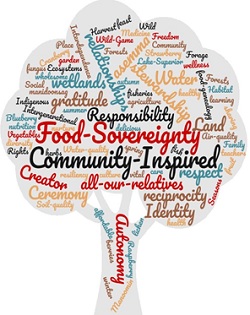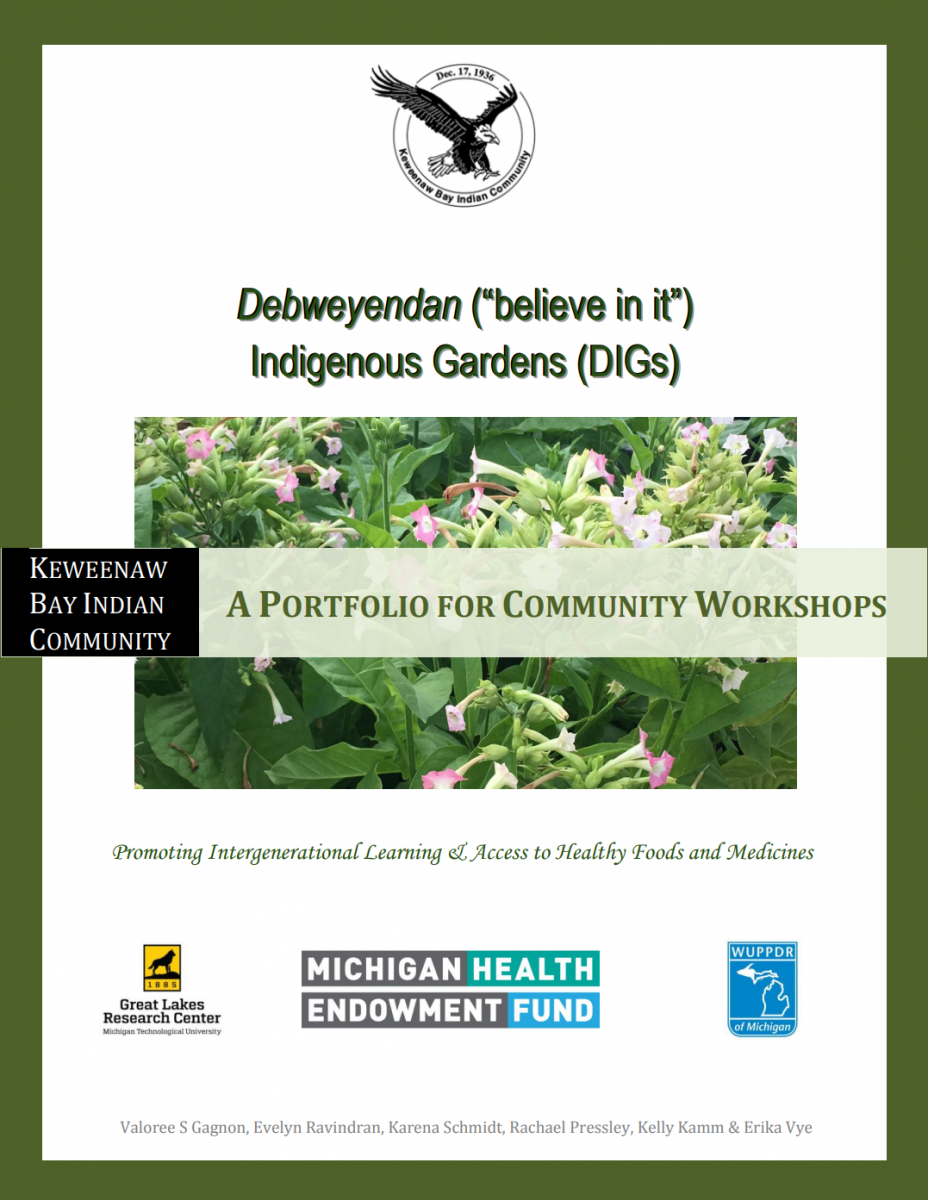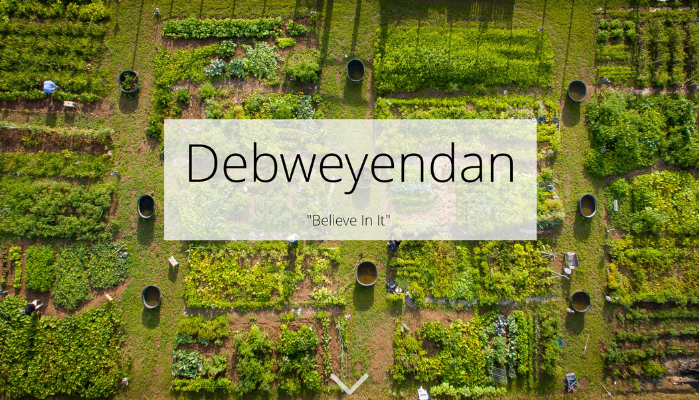Food and Medicines
What is Food Sovereignty?
Food sovereignty means to exercise autonomy in all territorial spaces: countries, regions, cities and rural communities. Food sovereignty is only possible if it takes place at the same time as political sovereignty of all peoples. ~ Declaration of the Forum for Food Sovereignty, Nyéléni 2007:5

We believe that food sovereignty is the ability to feed ourselves and feed ourselves well. It is a state of being in which our community is able to have a safe, culturally acceptable, and nutritionally adequate diet through a sustainable food system that promotes community self-reliance and social justice throughout the 1842 Treaty ceded-territory. Our territory is a rich and vast garden where foods and medicines abound throughout our forest and water landscape.
Practicing food sovereignty within the Keweenaw Bay Indian Community (KBIC) is about being Anishinaabe Ojibwa. Since time immemorial, our story is and has always been focused on cultivating and protecting relationships within ecosystems and between humans and beings of all kinds. We have endured a long and detrimental history yet our identity as a people survives. We are hunters, fishers, and gatherers; we share our harvests and our knowledge with each other. We envision the restoration of honorable harvesting across our landscape, and in doing so, we aim to strengthen food sovereignty for our community and all our relatives.
Today, food sovereignty education and outreach initiatives are critical to restoring and strengthening the KBIC – all activities of the KBIC Natural Resources Department promote the sovereignty of our nation. We invite you to learn more about what our department is doing to promote food sovereignty practices by exploring these resources:
Food Sovereignty is the right of peoples to healthy, affordable, and culturally appropriate food produced through ecologically sound and sustainable methods, and their right to define their own food and agriculture systems ~ La Via Campensina, 2007
U.P. Food Exchange Directory (Baraga County | Houghton County)
| Guidance and Teachings | |
|
A Portfolio for Community Workshops: Debweyendan Indigenous Gardens (DIGs) 2020 Program Evaluation: A Report for Debweyendan Indigenous Gardens (DIGs) (Jan, 2021) Food Sovereignty: A Food Summit presentation |
 |
This STORY MAP highlights the goals, knowledge shared, and outcomes of the Debweyendan (“believe in it) Indigenous Garden (DIGs) initiative. Enjoy our story!
Gagnon, V. S., Ravindran, E. H., Schmidt, K., Pressley, R., Kamm, K., and Vye, E. C., ResearchGate, DOI: Debweyendan(“Believe in it”) Indigenous Gardens (DIGs) Story Map (2020),10.13140/RG.2.2.17987.84002. Keweenaw Bay Indian Community Natural Resources Department; Contribution No. 78 of the Great Lakes Research Center at Michigan Technological University.
| Gardens, Plants, and Soils | |
 |
A diverse garden is an abundant garden! |
 |
A detailed guide to finding your plants' friends and foes |
 |
Getting to know the soils living in our gardens |
 |
When your plants need vitamins! |
 |
Debweyendan (“believe in it”) Indigenous Gardens (DIGs) Brochure |
 |
Bemaadizijig Ogitigaaniwaa (“Peoples’ Garden”) Featuring: hoop house, small fruits and tree orchard, beehives, medicinal plot, forest recovery, seed orchard and pollinator plots! |
| Native Plants, Animals, and Manidoosheg | |
 |
Delicious fruits of our homeland |
 |
Living in the Land of Dark Fruits Ode'imin, Shkiizhigomin, Miskwimin, Isawemin & more! |
 |
Guidelines to Help Identify Mushrooms Don't be afraid, but be careful! |
 |
Mushrooms to Celebrate the Spring |
 |
A narrative account of fungi uses among the Anishinaabeg |
 |
by Dana Richter |
 |
Witty conversationalists? |
 |
Beauty in the Balance |
 |
Common Bee Identification Guide Ten common groups of beneficial bees |
 |
Fact sheet from SaveNature.org |
 |
Manidoosheg Make it all Possible Lessons from native plants & their pollinators |
 |
Beautiful pictures, descriptions, Ojibwe & Latin names |
| Medicines and Recipes | |
 |
A Guide to the Four Medicines for All People Giizhik, Asemaa, Wiingashk, Mashkodewashk |
 |
List of plant names in Ojibwemowin |
 |
Honor the Earth: Sacred Tobacco Ponoka Walker interviewed by Winona LaDuke |
 |
Rethink Your Drink! A handy and beautiful booklet of teas |
 |
Good things to know about tomatoes |
 |
Fancy AND Delicious! |
 |
Crabapple Vinegar/Sauce Recipes From the Decolonizing Diet cookbook |
|
Decolonization Diet Project (NMU) A unique exploratory study |
|
The communal love of place creates a different world of action. ~ Robin Wall Kimmerer in The Intelligence in All Kinds of Life
Communities across the globe are engaged in food sovereignty activities – practices to restore and protect their local environments, economies, and cultures. Understanding food sovereignty is about getting to know place and people – histories and genealogies, human-environment relationships, and justice and ethics, as well as ecologies, economics, policy, technologies and more. To learn more about food sovereignty in our region, please visit these multi-media resources:
The Ways - Stories on Language and Culture
Western U.P. Food Systems Council
Great Lakes Now - Buffalo Reef Restoration
More Food Sovereignty Multimedia Resources
Food sovereignty asserts the need for sovereignty within sovereignty. ~ Audra Simpson 2014:10

